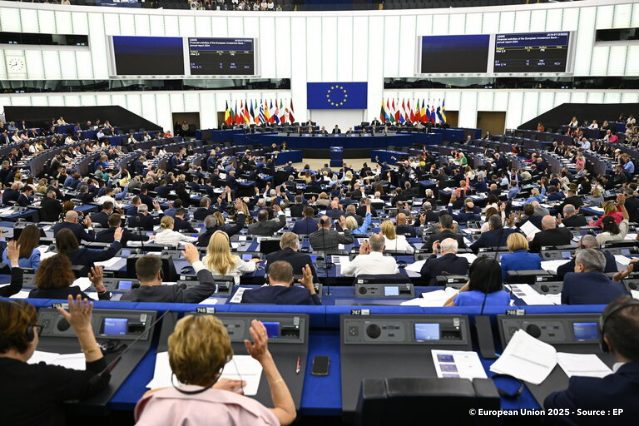
From 7 to 10 July, the European Parliament held its final plenary session before the summer recess, addressing a packed agenda that included key developments on energy, climate and preparations for the upcoming EU long-term budget for 2028 to 2034, which is scheduled for official presentation on 16 July. The session took place amid mounting political tensions, further highlighting the fragility of the coalition that has supported Ursula von der Leyen in securing a second term as President of the European Commission.
On 10 July, von der Leyen faced indeed a vote of no confidence, the first in more than a decade, initiated by the European Conservatives and Reformists (ECR) group. Although the motion was ultimately defeated, several Members of the European Parliament (MEPs) from groups generally supportive of the Commission, including the European People’s Party (EPP), the Socialists and Democrats, Renew and the Greens, chose not to cast their vote, signalling growing unease about the Commission’s direction. Initially prompted by concerns over transparency regarding text messages reportedly exchanged between von der Leyen and the CEO of Pfizer during the Covid-19 pandemic, the motion evolved into a broader expression of dissatisfaction, with many centrist and left-leaning MEPs using the occasion to criticise the Commission’s retreat on several Green Deal files.
In a related development, the Patriots for Europe (PfE) group, which has consistently criticised the EU’s climate policy framework, secured the role of rapporteur for the revision of the EU Climate Law, aiming to define an intermediate greenhouse gas emissions reduction target for 2040 as part of the pathway to climate neutrality by 2050. Rapporteur roles are assigned through a points-based system in which political groups bid for files based on their relative size. The EPP, the largest group in Parliament, did not manage to outbid the PfE, which had previously opposed the Commission’s proposal to reduce greenhouse gas emissions by up to 90 per cent by 2040 compared to 1990 levels and is now expected to use its position to delay or challenge the target. Other attempts to curtail PfE’s influence on the file were unsuccessful. A motion to fast-track the legislative process on the Climate Law revision, tabled by the Socialists and Democrats, Renew and the Greens, was rejected after the EPP voted against it.
In other notable developments during the plenary session, the Parliament adopted its position on the future of the Union’s energy security. The report calls for a stronger focus on resilience, infrastructure and security of supply, while also emphasising affordability and sustainability. MEPs also approved the extension of the EU’s gas storage scheme until the end of 2027, intended to strengthen supply preparedness ahead of future winters. The revised rules, which now await final approval by the Council, introduce greater flexibility by allowing Member States a two-month window to refill their reserves in an effort to avoid price spikes.
Looking ahead to the European Commission’s upcoming proposal on the Multiannual Financial Framework (MFF), expected this week, MEPs held a debate on the structure and strategic priorities of the next EU budget. Siegfried Mureșan, Romanian MEP and EPP co-rapporteur on the file, emphasised the need to preserve predictability for stakeholders, including researchers, while allowing sufficient flexibility to respond to changing needs. Leaked documents circulated on 7 July, which prompted wide discussion across the research and innovation community, confirmed that Framework Programme 10 (FP10) is expected to remain a standalone initiative, structured around four pillars: Excellent Science, Competitiveness and Society, Innovation, and the European Research Area. The new Pillar II on Competitiveness and Society is in particular expected to be tightly aligned with the EU Competitiveness Fund (ECF), whose proposal is also due to be released on 16 July. Details on financial allocations have not yet been disclosed.